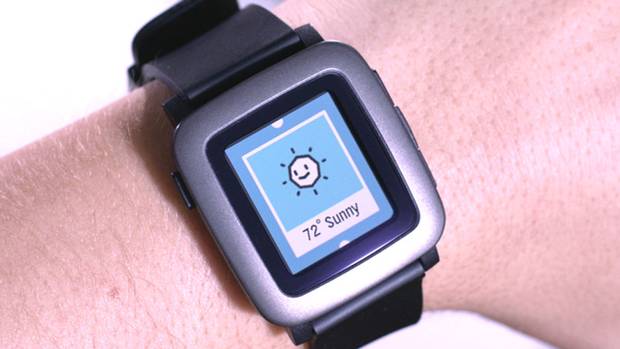The Canadian entrepreneur who kicked off the modern smartwatch frenzy three years ago has made a triumphant return to the humble crowdfunding platform that launched his company.
It took 49 minutes for Pebble Technology Corp. to set its latest Kickstarterrecord on Tuesday. In less than an hour, the smartwatch company that hand-made its first devices in a Waterloo, Ont., garage raised $1-million (U.S.) to fund its latest wearable computer, the Pebble Time.
“This is beyond our wildest dream,” Vancouver-born Eric Migicovsky, chief executive and founder of Pebble, said in a phone interview. The campaign started at 9:44 a.m. ET, and by 5:30 p.m. had blown past $6.1-million with more than 29,500 backers each pledging enough to get one or more of the new watches.
This latest Pebble smartwatch features significant hardware and software updates over the original, and early pledges can earn a $40 or $20 discount on the expected retail price of $199.
Back in April, 2012, Mr. Migicovsky made his first bit of crowdfunding history with a $10.2-million blockbuster campaign for the first Pebble. At the time, he says “We were five guys sitting in a living room here in Palo Alto.”
Pebble and Kickstarter have been joined at the hip ever since. This time, however, Pebble faces competition from much larger competitors. Tech giants including LG Corp., Samsung Electronics Co. Ltd., Motorola and Microsoft Corp. have all launched smartwatches in the last year. Apple will soon join them.
The Pebble Time, in development since 2013, has two notable upgrades. The first is a 64-colour e-paper screen that replaces the old black-and-white display, and a microphone has been added for input and quick responses to messages. (It’s also thinner, and the watchband is easier to replace.)
The second overhaul reboots the Pebble operating system with a concept that swims against the tide of competitors such as Apple or those using Google Inc.’s Android software: “Apps are not the right way to interact with information on the watch,” Mr. Migicovsky said.
The Pebble has about 6,500 custom-made apps and watchfaces (about one third of which are apps).
“If you’ve got a news app, a sports app, a stocks app, a travel app, you’re constantly going in an out of these apps every single second just to find more information – and that’s kind of annoying.
“This is a watch. You’re not supposed to be spending a lot of time on it.”
A new feature called timeline still uses data from apps, but it extracts those bits that are relevant and puts them into a browsable stream that updates throughout the day. Owners can add those parts of their digital lives they want on their wrist using Pebble’s companion smartphone app on iOS and Android. From weather and traffic in the morning or evening, say, or stock market close or open data, even calendar events and reminders.
About 1.2 billion traditional watches are sold every year, and about 23 per cent of those are digital (from the likes of Casio and Timex) according to Gartner wearable computing research director Angela McIntyre.
She estimates five million smartwatches were sold in 2014, against maybe 20 million fitness bands and another 18 million high-end sports watches.
At this point, Pebble could be in the top two or three smartwatch sellers worldwide, Ms. McIntyre says, but as smartwatches eat into existing watch and wristband categories, 2015 could belong to Apple.
“It was strategic on Apple’s part to pre-announce in the fall, to put in consumers’ minds that something even better was coming,” she says. Ms. McIntyre estimates smartwatch sales could top 40 million in 2015, with the Apple Watch accounting for half that figure.
Not everyone celebrated Pebble’s return to Kickstarter. A number of news outlets bemoaned Pebble, a well-funded company (it raised $15-million in 2013 and has 130 employees) that just sold its millionth smartwatch in January, using a platform intended for independent dreamers looking for their big break.
“We’re a place for creative projects that are in all stages of development. Lots of creators use Kickstarter even though they could get their work out to the public in some other way,” says David Gallagher, director of communications for Kickstarter.
Mr. Migicovsky said he was proud to offer his new watch to Kickstarter fans first. “That’s the community that got us to where we are today,” he said. “We want to do right by our community, so we decided to go back to them and ask them what they thought of our new watch.”
On the plus side, experience means this Kickstarter campaign is unlikely to be dogged by delays common to the platform.
“There’s no one more ready than us for a big-ass Kickstarter project,” Mr. Migicovsky said, adding the first Pebble Time watches will begin arriving in May.
SHANE DINGMAN – TECHNOLOGY REPORTER
The Globe and Mail
Published Tuesday, Feb. 24 2015, 12:00 PM EST
Last updated Tuesday, Feb. 24 2015, 6:49 PM EST


